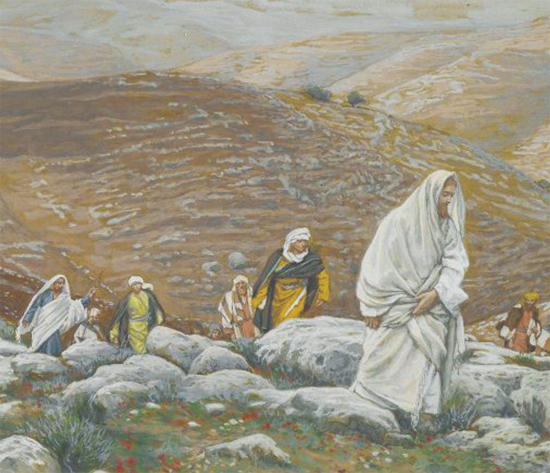Christian Art | Jesus Of Nazareth | Meditations On The Love Of Jesus Christ
Matthew 13: 54-58 – Week 17 Ordinary Time, Friday (King James Audio Bible KJV, Spoken Word)
54 And when he was come into his own country, he taught them in their synagogue, insomuch that they were astonished, and said, Whence hath this man this wisdom, and these mighty works?
55 Is not this the carpenter’s son? is not his mother called Mary? and his brethren, James, and Joses, and Simon, and Judas?
56 And his sisters, are they not all with us? Whence then hath this man all these things?
57 And they were offended in him. But Jesus said unto them, A prophet is not without honour, save in his own country, and in his own house.
58 And he did not many mighty works there because of their unbelief.
When Jesus returns to Nazareth, to his own country, he attends synagogue on the Saturday and teaches there, not as a leader of the synagogue but as a participant in the faith community. Nonetheless, Jesus’ teaching is different from other people’s. Jesus, we have been told, teaches with authority, and not as the scribes (Matthew 7: 29). Jesus does not merely interpret Scripture, according to scholarly tradition; rather, Jesus reworks Scripture, providing for the people a new Torah, which centres upon himself and which we may understand as Jesus himself. In this way, Jesus’ authority matches and exceeds that of Moses. Jesus is a new Moses, and then infinitely more.
The people who hear Jesus speak in the synagogue are affronted at what they hear. They know Jesus. He is the carpenter’s son, the only reference in the Gospel to the profession of St Joseph. They know his mother, Mary, and his wider family, his brethren. They know Jesus, in other words, as an ordinary member of their community, a man just like themselves. Perhaps they are jealous of such a man’s capacity to astonish them by speaking with such wisdom.
We may understand the people’s rejection of Jesus to be rooted in an attitude toward the community and to the members of the community. Even though they marvel at what Jesus has to say, they reject the possibility that a great prophet, let alone the Son of God, could be present among them. There is a narrowness of vision here. The people’s understanding is constrained by a need to categorize Jesus as a known quantity, even as their closeness to Jesus could have yielded a most vivid understanding of the truth. Instead, that which is already ‘known’ shuts the door on the truth. As the saying goes: no-one is a prophet in his own country.
So then we are asked to look again at our communities, at the people with whom we are familiar, whom we may think we know. We are asked to see Christ present in our fellow human beings in this everyday, familiar context, rather than as some faraway event. Just as with the parables, we are asked to find God talking to us, calling us, holding us by the hand and loving us, in the everyday.
Concluding Prayer | Jove Revealed By Jesus Christ
Lord God,
you hold out the light of your Word
to those who do not know you.
Strengthen in our hearts the faith you have given us,
so that no trials may quench the fire
your Spirit has kindled within us.
We make our prayer through our Lord.
![]()
King James Audio Bible | Endnotes
Jesus Of Nazareth | He Shall Be Called A Nazarene
Saint Jerome, prominent fourth-century Christian theologian and biblical scholar, explains that the term ‘Nazarene’ is likely derived from the Hebrew word ‘netser’, which means ‘branch’. Jerome notes that this word appears in various prophecies throughout the Old Testament, including Isaiah 11:1: ‘There shall come forth a shoot from the stump of Jesse, and a branch from his roots shall bear fruit.’ Jesse was the father of King David, and this prophecy was widely understood to refer to the coming of a Messiah who would be a descendant of David. According to Jerome, the term ‘Nazarene’ thus refers to the Messiah as the ‘Branch of David’ who would fulfil the promises of the prophets.
And yet Jesus is too Jesus of Nazareth – and so this becomes a part of the term Nazarene.
The Gospel of Matthew emphasizes the significance of Jesus being from Nazareth. In Matthew 2:23, the Gospel writer notes that Joseph and Mary settled in Nazareth after returning from Egypt with the young Jesus. The Gospel writer then quotes the prophets, saying, ‘He shall be called a Nazarene.’ This quotation is not found in any specific verse in the Old Testament.
That Jesus is of Nazareth is indisputable. The significance of Jesus being Jesus of Nazareth is multiply highlighted, for example in the Gospel of Saint John, where Nathanael expresses scepticism about Jesus’ identity. When Philip tells Nathanael that they have found the Messiah, Jesus of Nazareth, Nathanael responds: ‘Can anything good come out of Nazareth?’ (John 1:46) This passage shows that Nazareth was not a significant location in the eyes of the Jewish people, indeed was entirely marginal, yet Jesus, who was from Nazareth, was the fulfilment of prophecies from the Law and the prophets.
On one hand, Jesus’ humble origins and lowly status as a carpenter’s son identifies Jesus with the poor and marginalized, and shows God’s love and mercy to those who were and are often overlooked by society. On the other hand, Jesus’ identification with Nazareth highlights the tension between Jesus’ earthly identity and his divine mission. The people in Nazareth struggled to accept Jesus as a prophet and teacher because they thought they knew him as a humble carpenter’s son, and so by definition not as the Son of God.








